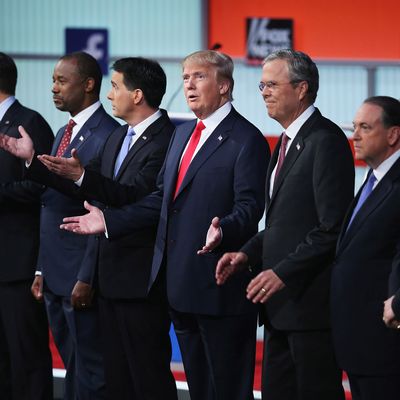
It’s a commonplace observation that the Trump era of American politics seems like it’s been going on forever. Truth is, though, it really only went into full swing four years ago today, when Republicans held their first presidential debate of the 2016 cycle in Cleveland and Donald Trump took the whole thing over.
Yes, he had launched his improbable campaign on June 16, 2015, with a bizarre word salad of a speech that would have probably killed any other candidacy instantly. And yes, by August 6, Trump was at the top of the polls in the sprawling 16-candidate Republican field (though at 24 percent he didn’t rank as high as Joe Biden, at 32 percent, does today among Democrats), which gave him the center-stage spot in Cleveland. And he had already displayed his ability to say outrageous things without consequences (in July he had disrespected John McCain’s war service, which I would have never imagined a pol in either party surviving). But that debate was when we first got a sense that Trump would keep turning debate stages into a one-ring circus, with himself always at the center. His very presence, and the likelihood that he might say anything, boosted viewership of the Fox News–sponsored debate to a record 24 million.
Here was the lede of the Washington Post’s Tumulty/Rucker write-up of the debate:
Donald Trump landed on the Republican debate stage like a hand grenade here on Thursday night — serving notice that he may run as an independent if he does not get the party’s nomination, dismissing criticism of his insulting comments about women as “political correctness” and flatly calling the nation’s leaders “stupid.”
The mogul grabbed the audience from the get-go by becoming the only candidate to raise his hand to refuse to pledge to support the ultimate party nominee. The question was very much aimed at him as a potential third-party “spoiler” candidate, and he toyed with it:
If I do win, and I’m leading by quite a bit, that’s what I want to do. I can totally make that pledge. If I’m the nominee, I will pledge I will not run as an independent. But – and I am discussing it with everybody, but I’m, you know, talking about a lot of leverage.
His feud with Fox News moderator Megyn Kelly began in that first debate, when he took exception to her question about the nasty things he had said about women over the years. He affirmed his scurrilous remarks about immigrants in an exchange with Chris Wallace in which his perennial debate patsy Jeb Bush was a bystander:
WALLACE: Mr. Trump, it has not escaped anybody’s notice that you say that the Mexican government, the Mexican government is sending criminals — rapists, drug dealers, across the border.
Governor Bush has called those remarks, quote, “extraordinarily ugly.”
I’d like you — you’re right next to him — tell us — talk to him directly and say how you respond to that and — and you have repeatedly said that you have evidence that the Mexican government is doing this, but you have evidence you have refused or declined to share.
Why not use this first Republican presidential debate to share your proof with the American people?
TRUMP: So, if it weren’t for me, you wouldn’t even be talking about illegal immigration, Chris. You wouldn’t even be talking about it.
(APPLAUSE)
TRUMP: This was not a subject that was on anybody’s mind until I brought it up at my announcement. And I said, Mexico is sending. Except the reporters, because they’re a very dishonest lot, generally speaking, in the world of politics, they didn’t cover my statement the way I said it.
The fact is, since then, many killings, murders, crime, drugs pouring across the border, money going out and the drugs coming in. And I said we need to build a wall, and it has to be built quickly.
And Trump kept the outrage machine churning after the debate, as Tim Alberta recounts in American Carnage, his book on Trump’s conquest of the GOP:
After the debate Trump went on CNN and insinuated that Kelly’s hostile questioning was due to her menstrual cycle. “You could see there was blood coming out of her eyes, blood coming out of her—wherever.” As with the McCain controversy, Trump didn’t flinch in the face of criticism.
And within a few weeks his lead over the rest of the GOP field had ballooned.
I conducted this stroll down bad-memory lane because it’s important to realize how little Trump has ever cared about the sensitivities he tramples on Twitter, at his fascistic rallies, in his media-baiting press appearances, and in interactions with other politicians. He has staked his career on a particular segment of the population and its antipathy to nonwhite people and to the “political correctness” that inhibits full-bodied expressions of racism and sexism. Sure, he will occasionally distance himself, as he did in his brief comments on the El Paso shootings over the weekend, from those who take his hateful attitude over the brink into physical, as opposed to rhetorical, violence. But violating norms of decency is at the rotten core of his politics, and that won’t change until he’s truly off the stage.






























